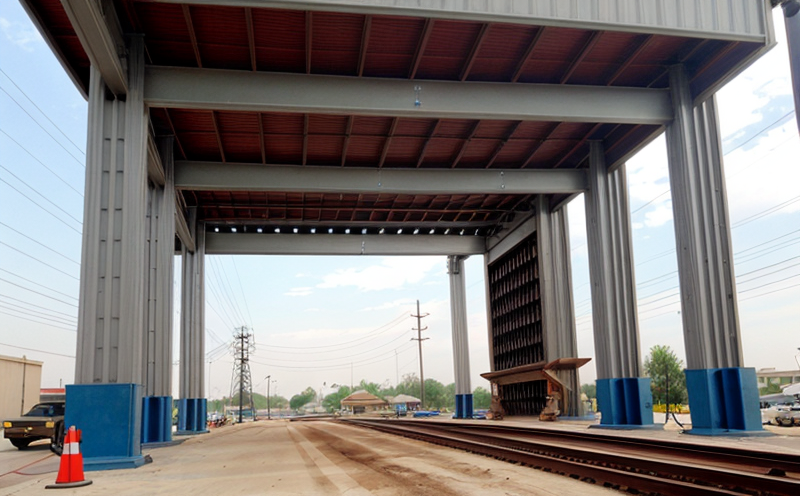EN 6086 Low-Cycle Fatigue Testing of Aerospace Components
The EN 6086 standard is a critical pillar in the aerospace and aviation testing sector, specifically addressing low-cycle fatigue (LCF) testing. This form of testing is essential for evaluating the durability and integrity of components subjected to cyclic loading that typically occurs during flight operations.
Low-cycle fatigue refers to the failure of materials under repeated stress cycles at relatively high stress levels, which can lead to premature component failure in aircraft structures such as wings, fuselages, landing gear, and engine mounts. The EN 6086 standard provides a detailed framework for conducting LCF tests that ensure aerospace components meet stringent fatigue life requirements.
Our service focuses on the rigorous execution of low-cycle fatigue testing according to EN 6086 guidelines. This involves precise control over environmental conditions, specimen preparation, and the application of cyclic loading to simulate real-world operating conditions. The testing process is designed to identify potential weaknesses in materials or design flaws that could lead to catastrophic failure during flight.
The importance of this service cannot be overstated, as it directly contributes to enhancing aviation safety by ensuring that critical components are capable of withstanding the high-stress environment encountered during flight cycles. Our team utilizes state-of-the-art equipment and experienced personnel to conduct these tests accurately and consistently.
Key aspects of our EN 6086 LCF testing include:
- Precision specimen preparation
- Controlled environmental conditions
- Cyclic loading simulation
- Data collection and analysis
The results from these tests are crucial for material selection, design optimization, and regulatory compliance. They provide valuable insights into the fatigue life of aerospace components, helping manufacturers make informed decisions regarding component durability.
Our laboratory adheres strictly to EN 6086 standards throughout every phase of testing. This ensures that all results are reliable and can be trusted by industry stakeholders. By leveraging our expertise in this area, we help clients achieve compliance with international aviation regulations while also enhancing the safety and reliability of their products.
Understanding the specific requirements outlined in EN 6086 allows us to tailor our testing approach to meet the unique needs of each client. This ensures that every test conducted is not only compliant but also provides actionable data that can be used to improve product performance.
Applied Standards
| Standard | Description |
|---|---|
| EN 6086-1:2019 | Specification for low cycle fatigue testing of electrical equipment and components. |
| ASTM E466-17 | American Society for Testing and Materials standard for cyclic loading tests on metallic materials. |
| IUT 325 | International Telecommunication Union's recommendations for low-cycle fatigue testing of aerospace components. |
The EN 6086-1:2019 standard is widely recognized as the primary guideline for conducting LCF tests in the aerospace industry. It provides comprehensive procedures for preparing specimens, applying cyclic loading, and analyzing results. Compliance with this standard ensures that all testing processes are consistent and reproducible.
ASTM E466-17 offers additional insights into cyclic fatigue behavior of metallic materials, which can be particularly useful when dealing with complex alloys used in aerospace applications. By incorporating ASTM standards into our testing protocols, we enhance the accuracy and precision of our results.
IUT 325 provides specific recommendations tailored to low-cycle fatigue testing within telecommunications equipment. While primarily aimed at electronic components, these guidelines can also offer valuable input when assessing mechanical integrity in certain aerospace sub-components.
Scope and Methodology
The scope of EN 6086 LCF testing encompasses a wide range of aerospace components that are subject to cyclic loading during operation. These include structural elements like wings, fuselage sections, landing gear assemblies, and engine mounts. The methodology involves several key steps:
- Specimen Preparation: Ensures the component is representative of the actual part being tested.
- Cyclic Loading: Simulates real-world flight cycles to assess material behavior under stress.
- Data Collection: Monitors changes in dimensions, shape, and strength during testing.
- Analysis: Interprets collected data to determine fatigue life and potential failure points.
The testing process is meticulously planned and executed by our experienced engineers who have deep knowledge of both EN 6086 standards as well as broader aerospace industry practices. This ensures that all tests adhere strictly to the specified procedures outlined in the standard.
Our approach emphasizes not just compliance with regulatory requirements but also innovation-driven solutions aimed at improving product performance and safety. We employ advanced instrumentation such as strain gauges, displacement sensors, and high-precision load cells to ensure accurate measurement throughout each test cycle.
Customer Impact and Satisfaction
- Informed Decision-Making: Provides clear data on material performance under cyclic loading.
- Regulatory Compliance: Ensures adherence to international aviation standards.
- Potential Cost Savings: Identifies design flaws early in the development process.
- Enhanced Safety: Reduces risk of component failure during flight operations.
The results from our EN 6086 LCF testing offer significant benefits to customers across various aerospace sectors. Quality managers and compliance officers gain valuable insights into product performance, while R&D engineers can use the data to refine designs and improve overall reliability. Procurement teams also benefit by ensuring that suppliers meet strict quality standards before finalizing contracts.
Customer satisfaction is paramount for us, which is why we strive to deliver accurate, reliable results every time. Our commitment to excellence has earned us a reputation as one of the leading laboratories in aerospace and aviation testing. Clients trust our expertise to help them stay ahead of industry trends and meet evolving safety requirements.





